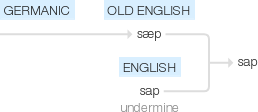Sap
Old English sæp, probably of Germanic origin. The verb (dating from the mid 18th century) is often interpreted as a figurative use of the notion ‘drain the sap from’, but is derived originally from the verb sap2, in the sense ‘undermine’.
wiktionary
From Middle English sap, from Old English sæp(“juice, sap”), from Proto-West Germanic *sap(“sap, juice”) (compare Dutch sap, German Saft, Icelandic safi), from Proto-Indo-European *sab-, *sap-(“to taste”) (compare Welsh syb-wydd(“fir”), Latin sapa(“must, new wine”), Russian со́пли(sópli, “snivel”), Armenian համ(ham, “juice, taste”), Avestan 𐬬𐬌-𐬱𐬁𐬞𐬀 (vi-šāpa, “having poisonous juices”), Sanskrit सबर्(sabar, “juice, nectar”)). More at sage.
Probably from sapling.
From French saper (compare Spanish zapar and Italian zappare) from sape(“sort of scythe”), from Late Latin sappa(“sort of mattock”).
etymonline
sap (n.1)
"liquid in a plant," Old English sæp, from Proto-Germanic *sapam (source also of Middle Low German, Middle Dutch, Dutch sap, Old High German saf, German Saft "juice"), from PIE root *sab- "juice, fluid" (source also of Sanskrit sabar- "sap, milk, nectar," Irish sug, Russian soku "sap," Lithuanian sakas "tree-gum"). As a verb meaning "To drain the sap from," 1725.
sap (n.2)
"simpleton," 1815, originally especially in Scottish and English schoolboy slang, probably from earlier sapskull (1735), saphead (1798), from sap as a shortened form of sapwood "soft wood between the inner bark and the heartwood" (late 14c.), from sap (n.1) + wood (n.); so called because it conducts the sap; compare sappy.
sap (v.1)
"dig a trench toward the enemy's position," 1590s, from French saper, from sappe "spade," from Late Latin sappa "spade" (source also of Italian zappa, Spanish zapa "spade"). Extended sense "weaken or destroy insidiously" is from 1755, probably influenced by the verb form of sap (n.1), on the notion of "draining the vital sap from." Related: Sapped; sapping.
sap (n.3)
"club, stick for hitting," 1899, from shortening of sapwood (see sap (n.2)) or sapling.
sap (v.2)
"hit with a sap," 1926, from sap (n.3). Related: Sapped; sapping.
